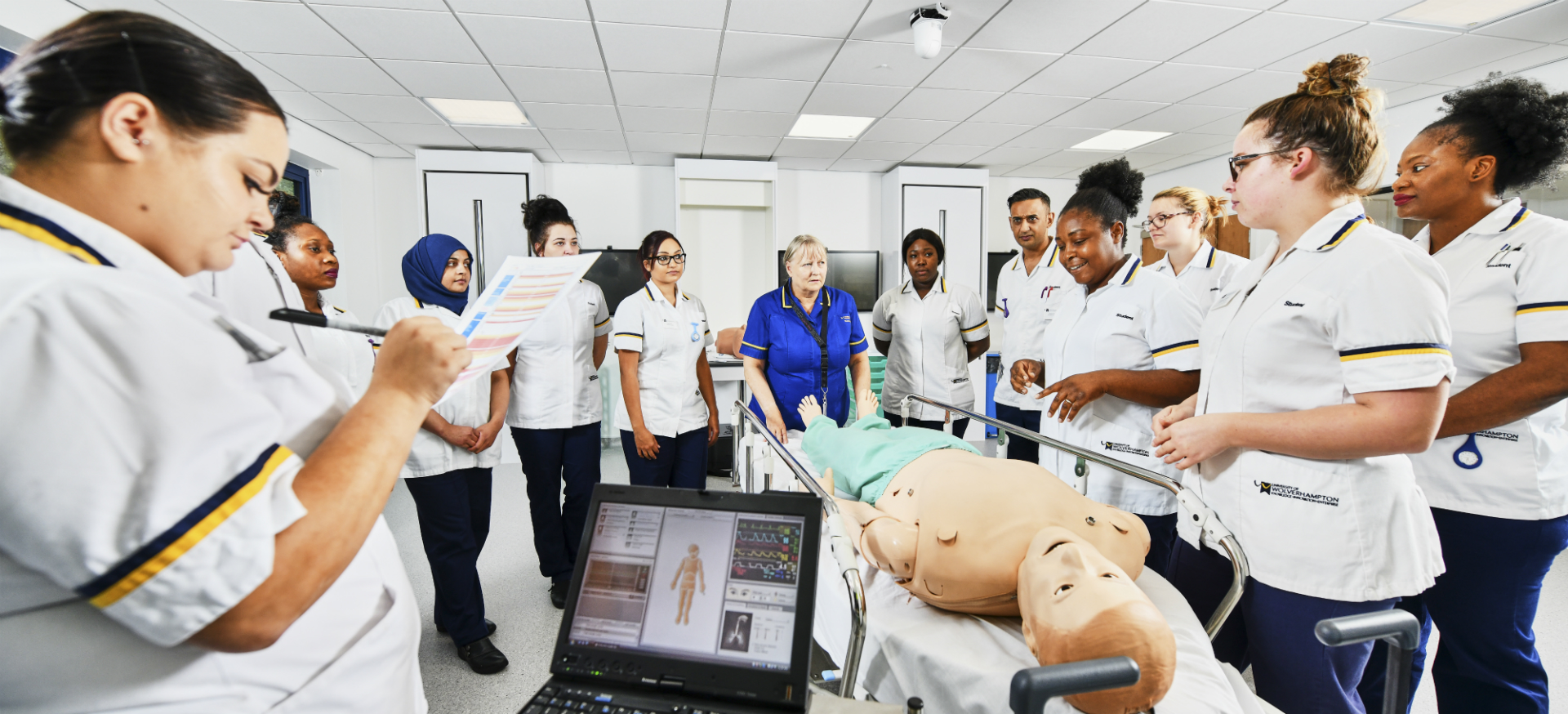Welcome to the Nursing Associate Programme site.
The page below contains information we hope will support you as Practice Assessors and Practice Supervisors to support students during their placement learning experiences on their programme.
-
Course Leader Teresa Shaw T.Shaw2@wlv.ac.uk
-
Course Leader Ian Cooper Deputy I.Cooper3@wlv.ac.uk
-
Practice Lead Lorna Southan Lorna.Southan@wlv.ac.uk
-
Practice Educator Katie Oluwajobi K.Oluwajobi@wlv.ac.uk
- Nursing Associate Placement Handbook (Word doc 628k)

Becoming a new placement provider for undergraduate student?
Are you thinking about becoming a placement provider? Here you’ll find out how.
Becoming a placement provider gives you the opportunity to work in partnership with Health Education England (HEE) and the University. You'll help to develop a skilled, effective workforce to meet the health needs of the region, now and in the future. At the University of Wolverhampton we support a range of students including Nursing (Adult/Child/Mental Health and Learning Disabilities) Midwifery, Paramedic Science, Physiotherapy and Occupational Therapy (pending approval 2020/2021).
Step one
After you express an interest in hosting placements, you can to do this by emailing our External Partnerships Team FEHWexternalpartnerships@wlv.ac.uk, you will be contacted by a Practice Placement Lead.
Please complete this Placement Request Form (Word doc 250k) which will help us to discuss your request.
Step two
An initial visit will be made by your Practice Placement lead to discuss placements further and a profile will be completed of your placement area.
The PPL will help you identify supported needed to host students in line with NMC/HCPC requirements. The University of Wolverhampton can support development of these roles.
Step three
You will be sent a Practice Placement Agreement our external partnerships team. This needs to be signed and returned to that team.
Step four
Your placement setting(s) will be quality audited by the placement team. This covers elements such as student support and assessment, learning and teaching opportunities, and CQC ratings.
Step five
You will then be allocated your first students.
500 word practice learning page introduction for Dominic
Effective practice placements promote effective learning and within the Nursing Associate Apprenticeship (NAA) programme practice learning is a tri-partite relationship which exists between the apprentice, the employer and the University of Wolverhampton. This mutual relationship strengthens the support for each NAA while they complete a 2 year foundation degree apprenticeship programme as they combine clinical responsibilities and theory time.
The new Nursing and Midwifery Council (NMC) curriculum launched in September 2019 for Nursing Associates stipulates they must complete 50% of the programme hours in theory based learning (university plus facilitated study time) and 50% in practice (host and external placements) to capture exposure to all four fields of nursing. Only hours that are protected, where hours can be supervised, constitute programme hours. The range and type of placements will vary according to the programme, service demands and individual learning needs. Further information can be found in the placement handbook and the NMC Standards for pre-registration nursing associate programmes (2018). https://www.nmc.org.uk/globalassets/sitedocuments/education-standards/nursing-associates-programme-standards.pdf
Learning in practice is facilitated by a range of health care staff and is based on the Standards for Student Supervision and Assessment (SSSA), (NMC, 2018). Practice Supervisors will be responsible for supervising supporting and guiding the student through their journey to ensure effective learning. The Practice Assessor has a key role in assessing and confirming student’s proficiency providing assurance of student achievements and competence while the Academic Assessor confirms the students’ overall progress.
Visibility in our practice areas is important as provides an opportunity to meet practice assessors and supervisors directly to discuss the progress of each NAA and this is achieved through skills coaching and practice educator support. Skills Coaches facilitate tripartite mandatory quarterly discussions to review progress in-line with Apprenticeship standards. Practice Educators work closely with practice partners to support, monitor and teach NAAs in line with the frameworks laid out originally by Health Education England (HEE) (2017) and latterly by the NMC (2018). Another key role of Practice Educators is conducting university and practice based workshops for NAAs and Practice Assessors alike to support with the completion of practice documents. PAD completion resources accessible here.
Practice learning focuses on achievement of key elements as outlined within the MYEPAD practice documents: https://www.myeplg.ac.uk/index.aspx. Generally this encompasses:
- Inter-professional learning
- Protected learning time (supervised practice)
- Episodes of care assessments
- Medicines management
To provide the student with high quality learning experiences the university provides various electronic and paper resources to augment clinical knowledge and application. These are accessible from the practice module CANVAS page.


/prod01/wlvacuk/media/departments/digital-content-and-communications/submitted-news-images/Smelting-knife.png)
/prod01/wlvacuk/media/departments/digital-content-and-communications/images-2024/250630-SciFest-1-group-photo-resized-800x450.png)
/prod01/wlvacuk/media/departments/digital-content-and-communications/images/stock-images/WLV-email-header-banner---City-courtyard---Opportunity-teaser.png)
/prod01/wlvacuk/media/departments/digital-content-and-communications/images-2024/Arthi-Arunasalam-teaser.jpg)
/prod01/wlvacuk/media/departments/digital-content-and-communications/submitted-news-images/Ben-Wittaker.jpg)
/prod01/wlvacuk/media/departments/digital-content-and-communications/submitted-news-images/Business-School-800x450.jpg)
/prod01/wlvacuk/media/departments/digital-content-and-communications/images-2024/240920-Forensic-Science-Resized.jpg)